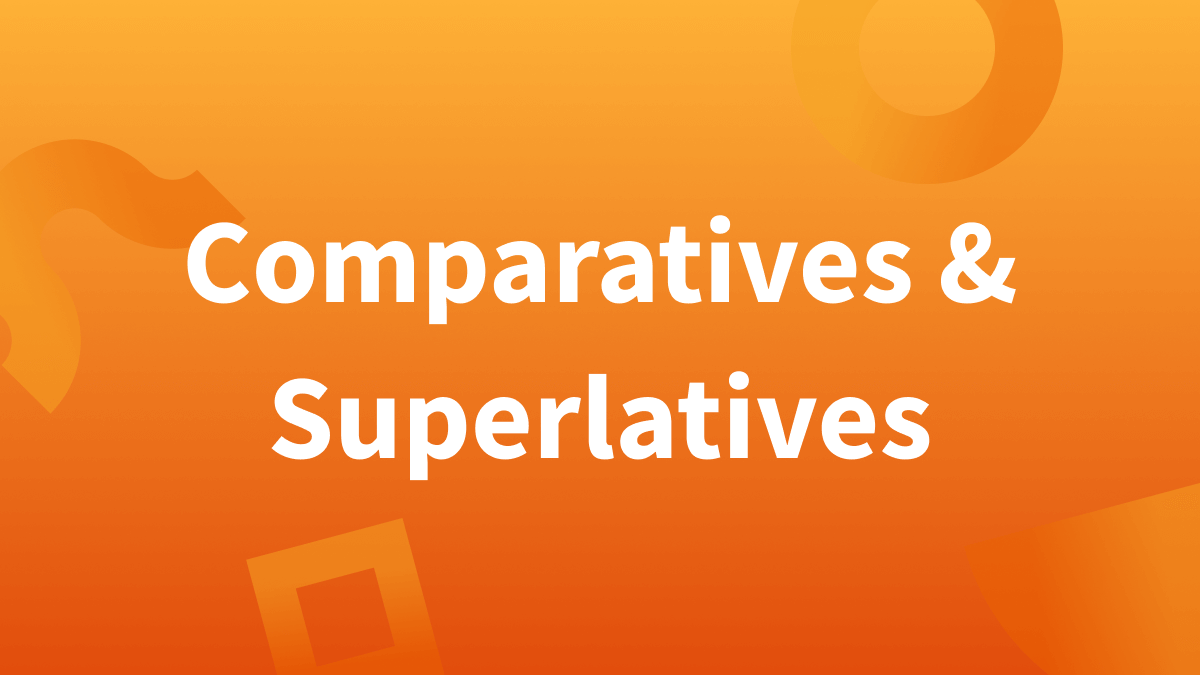- Comparative adjectives compare two nouns.
- Superlative adjectives describe nouns in an extreme way, as in being the most or the least of a quality.
- ○ His truck is newer and bigger than mine.
- ○ But our sister, Samantha, had the newest and biggest truck of them all.
What Is a Comparative and Superlative Adjective?
Comparatives and superlatives are adjective forms used to describe nouns (a person, place, thing, or idea). But what’s the difference between comparative and superlative adjectives? This quick guide will provide the answer by going over comparative forms of adjectives, superlative forms of adjectives, teaching you how to form them, discussing irregular comparatives and superlatives, and providing example sentences.
Comparative Form of Adjectives
Comparatives in English are used when comparing two nouns. There are two ways to create comparative adjectives.
You can either add “—er”:
Loud → Louder
Or, you can add more in front of the adjective.
Expensive → More expensive
The rule of thumb is that with short words (also known as monosyllabic), the comparative is formed by adding “—er” (e.g., lower), while longer words use a preceding more (e.g., more important). However, English language rules carry a boatload of exceptions, and this one is no different.
Here are a few more comparative examples:
Clean → Cleaner:
The house was cleaner than I remembered.
Round → Rounder:
Liam was teaching me how to mold a rounder sphere.
Peaceful → More peaceful:
Things have been more peaceful for me.
Superlative Forms of Adjectives
The difference between comparative and superlative adjectives is that superlatives are used to show that an adjective is the most or least of a quality. In other words, they describe a noun in an extreme way. Usually, superlatives compare an individual to a group.
Like comparatives, there are two ways to form superlatives:
You can either add “—est”:
Loud → louder → loudest
Or by adding most in front of the adjective:
Expensive → more expensive → most expensive
Additionally, superlatives are always preceded by the determiner “the.”
Some superlative examples include:
Fat → fatter → fattest:
I chose the fattest puppy of them all.
High → higher → highest:
Jordan got the highest grade in the class.
Famous → More famous → Most famous:
She was the most famous sibling.
Like comparatives, forming superlatives means short words typically get “—est” while longer words get most in front of it.
The Comparative and The Superlative
Unfortunately, comparatives and superlatives are not always as direct as the explanation above; nothing in the English language is. There are also irregular comparatives and superlatives. This means that these words don’t follow the previously mentioned rules of using “—er,” “—est,” more, or most. A few of those include:
Good → Better → Best
Many/Much → More → Most
Bad → Worse → Worst
Don’t let this worry you, though. LanguageTool can help you achieve better writing by correcting spelling and grammar mistakes. This multilingual text editor can also strengthen your writing by providing synonyms that’ll help you accurately convey your message and providing stylistic improvements. Try it out.

